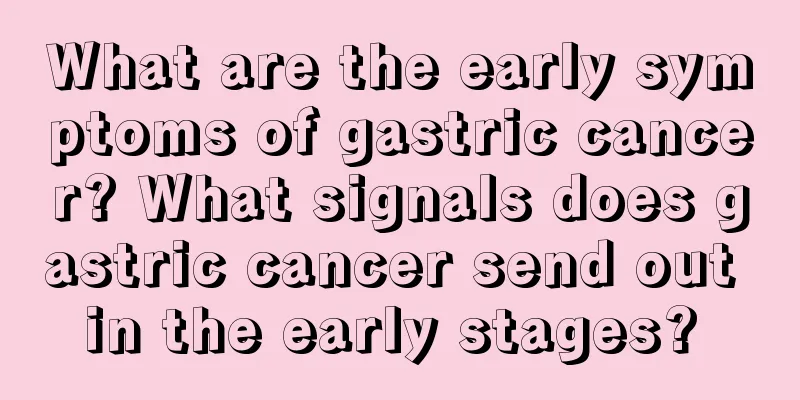What are the early symptoms of gastric cancer? What signals does gastric cancer send out in the early stages?

|
The peak age for gastric cancer incidence is 50 to 80 years old, but Xu Chong'an said that gastric cancer has been tending to become younger in recent years. People at high risk of gastric cancer include: those with moderate to severe gastric ulcers, atrophic gastritis, intestinal metaplasia or atypical hyperplasia; those infected with Helicobacter pylori; those who have had gastric surgery for more than 10 years; those who like to eat hard, pickled and high-salt foods and have symptoms of stomach discomfort; those with pernicious anemia; those with a family history of gastric cancer and esophageal cancer; obese people, those who are mentally stimulated and depressed; and those who work in a dusty environment for a long time. Here are some early signs of stomach cancer: 1Upper abdominal discomfort and fullness
There is often a burning, gurgling, and bloating sensation in the abdomen, which is especially noticeable after meals and becomes increasingly severe as the disease progresses. These symptoms should be distinguished from indigestion and chronic gastritis. Indigestion is often associated with a history of careless diet and overeating, while chronic gastritis often has a history of recurrent attacks. 2. Loss of appetite
Early gastric cancer often presents suddenly with loss of appetite and aversion to greasy food. This should be distinguished from hepatitis. Hepatitis often presents with elevated transaminase levels, fever, fatigue, dark tea-colored urine, jaundice and other systemic symptoms. 3. Nausea, belching, acid reflux and vomiting
When the gastric cancer lesion is located in the pyloric area at the outlet of the stomach, nausea is most obvious. If the stomach outlet is completely blocked, a sour or eggy odor will be belched, or vomiting may occur, and the vomitus is mostly old food and gastric juice. 4Upper abdominal pain
The pain of early gastric cancer is irregular or manifests as continuous dull pain, unlike gastric ulcer or duodenal ulcer, which has the obvious pain after or before meals. If the patient has gastric or duodenal ulcers, the regularity of the pain may suddenly change, and the drugs that were originally effective in treating the ulcers may suddenly become ineffective or their effects may be significantly reduced. 5. Vomiting blood and black stools
If the cancer only destroys small blood vessels, it often manifests as "occult blood" in the stool, that is, although the stool looks normal, laboratory tests can reveal blood cells in it. If it invades larger blood vessels in the early stages, it will cause vomiting of blood and black or tarry stools. The occult blood and black stools of gastric cancer are persistent and stubborn, while the bleeding caused by gastric and duodenal ulcers is mostly intermittent and can be stopped with timely treatment. 6 Rapid weight loss and severe anemia:
Because cancer is a wasting disease, and gastric cancer can cause malabsorption and gastrointestinal bleeding in patients, which further aggravates weight loss and anemia. |
<<: Who should not eat fish? These four groups of people are not suitable for eating fish
>>: Six secrets of tongue and health: purple tongue due to too much toxin deposits
Recommend
What are the causes of ulcerative stomatitis?
Ulcerative stomatitis is a relatively common dise...
What to do if your nails are broken
In daily life, people often suffer nail injuries ...
Can stomach cancer cause jaundice?
Gastric cancer is a common disease in life, and i...
How to prevent cervical cancer in life What is the best food to eat for cervical cancer
The incidence of cervical cancer in women is on t...
Beware! Classification of kidney cancer
In recent years, kidney cancer has become one of ...
May I ask what is the principle of hair transplantation
Nowadays, technology is developing faster and fas...
The pimples are swollen and hard
Many people have acne not only on their faces, bu...
Why are fried dough sticks hard
Many people in our daily life like to eat fried d...
I get acne after shaving
Just like girls, boys also need to pay attention ...
What is the response to chemotherapy for pancreatic cancer
What is the response to chemotherapy for pancreat...
What are the effects and functions of kudzu flowers
Office workers may have a lot of social engagemen...
Which is better, beauty lens liner or beauty eyelash liner
In recent years, people have gradually paid more ...
The soles of my feet get hot in summer
The weather is very hot in summer and the whole b...
Six diseases can be cured with a hot towel
When the body is hurt, many people are accustomed...
Wash your face with hot water. Is it really good to wash your face with hot water?
Although washing face is something we all do ever...









